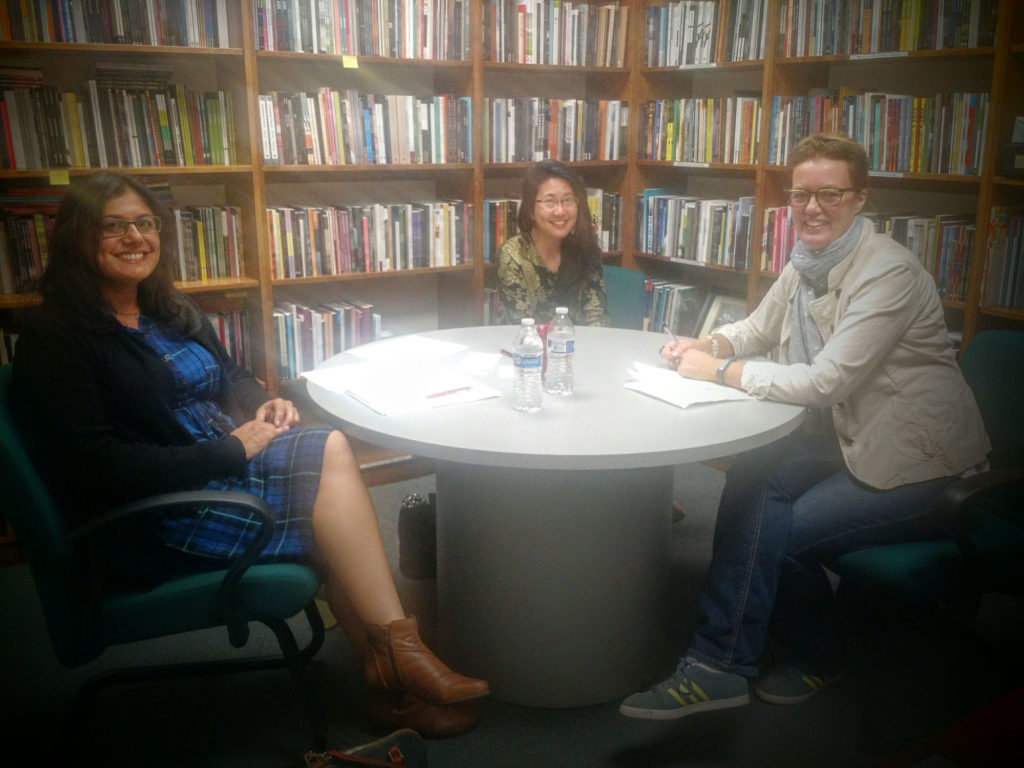Searching for “that other thing”…“the ineffable”: The Tufts Screeners Come to Town

Claremont Graduate University’s Kingsley & Kate Tufts Poetry Awards never sleep; instead they are part of a poetic wheel, ever turning, always moving forward. In fact, as the CGU community announced and then welcomed the 2016 Tufts poets this past spring, hosting both Danez Smith (winner of the Kate Tufts Discovery Award for newly emerging poets) and Ross Gay (recipient of the Kingsley Tufts Poetry Award for poets excelling midcareer), submissions for the 2017 cycle were already steadily pouring in. And just a week after Gay’s week-in-residence at CGU in early October, three preliminary readers gathered together in the backroom of the Tufts office in Harper Hall to begin the important and arduous task of selecting next year’s winners.
This year’s Kingsley & Kate Tufts screeners are all accomplished educators and poets in their own right. Linda Dove earned her PhD in Renaissance literature and is an adjunct professor at both Woodbury University and Pasadena City College. She is additionally the prize-winning author of the chapbook O Dear Deer, (2011) and the earlier collection In Defense of Objects (2009). A new chapbook, This Too, is forthcoming from Tebot Bach in 2017.
Karen An-hwei Lee received her MFA from Brown University and a PhD in American and British literature from UC, Berkeley. With years of experience as a college professor, Lee is currently a vice provost at Point Loma Nazarene University. She is also an award-winning poet, author of the poetry collections Phyla of Joy (2012), Ardor (2008), and In Medias Res (2004) plus a book of literary criticism, Anglophone Literatures in the Asian Diaspora (2013).
Mehnaz Sahibzada earned a MA in religious studies from the University of California, Santa Barbara. In addition to teaching high school English at New Roads School in Santa Monica, Sahibzada is the author of the poetry chapbooks Summer Forgets to Wear a Petticoat (2016) and Tongued Tied: A Memoir in Poems (2012) and her work is included in the anthology Wide Awake: Poets of Los Angeles and Beyond (2015).
Into these incredibly capable hands fell the awesome responsibility of making the initial call on the plethora of poetic works submitted for Tufts consideration this year. And after months of careful, independent perusal, these three talented individuals convened to compare notes and reach a communal consensus, culling over 250 entries for the Kingsley Award down to a list of approximately 40 remaining contenders and slimming around 175 submissions for the Kate Discovery Award down to roughly 25 frontrunners. When I heard that this was happening, I knew that I had to come take a quick peek at this enormous process and momentarily speak with the Tufts screeners about their insights and experiences.
I started off our short and informal interview by asking how they each made the difficult decisions inherently involved in wading through such a vast amount of poetry and evaluating which collections deserved further attention from the final Tufts judges.
Lee had a ready answer: “There are high points in a lot of these [works] and they’re all merit worthy…A lot of the entries, as we’ve agreed, are really strong, amazing collections. And there are just those select few that will be phenomenal and have those distinctives that set them apart.”
Dove added that the fact that each entry had been previously published was a definite benefit and challenge: “They’ve been vetted” whereas with manuscript submissions you get “a huge range of quality. But here…everybody was writing really competent, lovely poetry. So then you have to kind of elevate to the next level to figure out which ones are such standouts.”
Lee: “So for me, it was not a ‘sheep from the goats’ kind of thing, but instead [separating] ‘sheep from the sheep.’”
After a brief moment of contemplative consideration, Sahibzada responded: “It was [especially] challenging for me when I recognized that a collection was well-written but I didn’t engage with it emotionally…I had to reread it to get to that place where it would speak to me.”
Acknowledging that they are all accomplished poets themselves, Sahibzada’s observation caused me to wonder aloud if they came to the judging process with a double vision, weighing both their intellectual but also artistic responses.
Dove revealed that her own relationship to poetry impacted her reactions: “Well, I wrote down some of my criteria…the last one is ‘that other thing’…‘that heartbeat sped up, that surprise.’”
Lee: “And we also teach, so we bring that to the judging as well…[in my rubrics] I have a row for assessing poetry that’s ‘the ineffable.’”
Hoping to bow out gracefully and make up for my clumsy graduate student ambush of these already taxed individuals, I asked my parting question: “Were there any [submissions] that didn’t make the common list that maybe you’re still fighting for or hoping for?”
Dove, without any hesitation, deadpan but with a healthy heaping of grace: “Well – that’s what we’re doing right now.”
“Oh, so that’s what I interrupted” was all I could find to say as we all shared a brief moment of polite laughter. And so I left them to it. Already having almost conquered their Kate Tufts deliberations during the morning hours, after lunch they still faced the contemplation of the Kingsley Tufts submissions. And I inwardly wished these screeners luck, equally envious of their exposure to such a bounty of great poetry and glad to not be personally faced with their duty of searching through it all for “that heartbeat sped up, that surprise.”
—Brock Rustin
Share